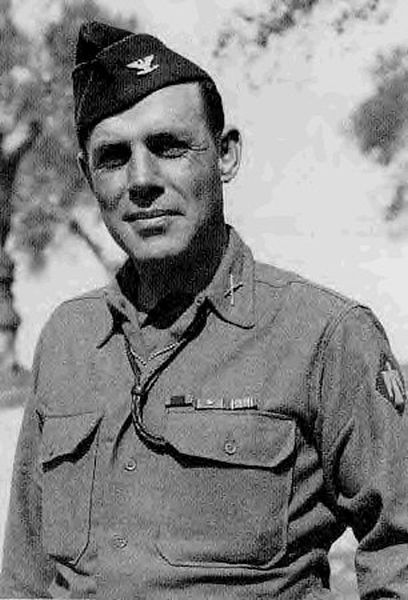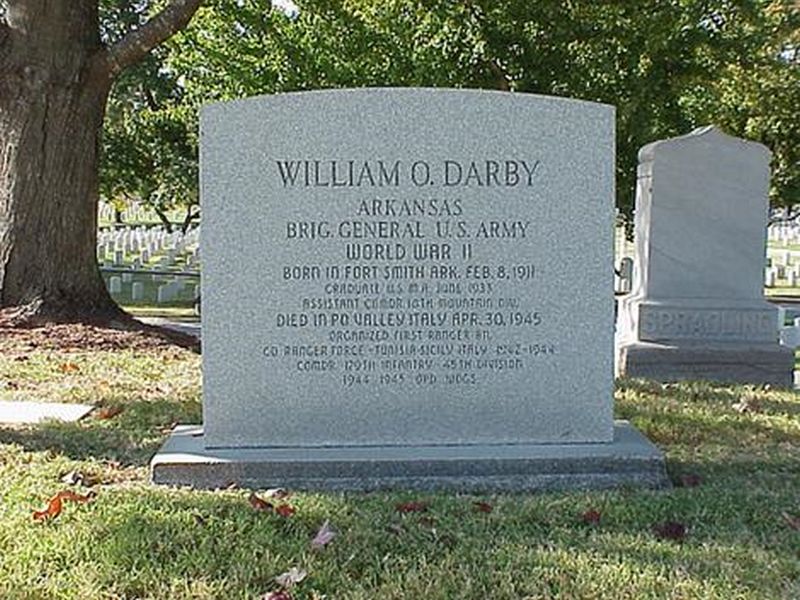Darby, William Orlando "Bill"
- Date of birth:
- February 8th, 1911 (Fort Smith-Sebastian County/Arkansas, United States)
- Date of death:
- April 30th, 1945 (near Trento-Po River Valley, Italy)
- Buried on:
- Fort Smith National Cemetery
- Service number:
- 0-19133
- Nationality:
- American
Biography
William Orlando Darby was born on February 8th, 1911 as son to Percy Darby and Nell Darby. Darby was killed in action on April 30th, 1945. At first he was buried at the American War Cemetery in Cisterna but later he was reinterred at the Fort Smith National Cemetery on March 11th, 1949.
Promotions:
1933: 2nd Lieutenant;
?: 1st Lieutenant;
September 9th, 1940: Captain;
?: Lieutenant Colonel;
1944: Colonel;
May 15th, 1945: Brigadier General (posthumous).
Career:
?: Bell Grove School;
?: Fort Smith Senior High School;
1929 - June 13th, 1933: United States Military Academy, West Point;
?: 1st Battalion, 82nd Field Artillery, 1st Cavalry;
?: Assistant Executive/Supply Officer, 82nd Field Artillery, Fort Bliss;
July 1934: Detachment Commander, 1st Cavalry Division, Cloudcroft, New Mexico;
September 1937 - June 1938: Field Artillery School, Fort Sill, Oklahoma;
September 1940: 80th Division;
1941: Aide-de-Camp, 34th Infantry Division;
July 9th, 1942: Commanding Officer, 1st Ranger Battalion ("Darby's Rangers);
?: Commanding Officer 6615th Ranger Force;
February 17th, 1944: Commanding Officer 179th Infantry Regiment, 45th Infantry Division;
?: Army Ground Forces, USA;
?: Section Chief, War Plans Division, General Staff, Pantagon;
?: Assisting Commanding Officer, 10th Mountain Division.
Do you have more information about this person? Inform us!
- Period:
- Second World War (1939-1945)
- Rank:
- Lieutenant Colonel
- Unit:
- 1st Ranger Battalion, Central Task Force, U.S. Army
- Awarded on:
- March 7th, 1943
“For conspicuous gallantry and intrepidity in action against the enemy while serving as Commanding Officer, 1st Ranger Battalion, on the early morning of 12 February 1943, in the vicinity 5 miles west of Sened Station, Tunisia. Lieutenant Colonel Darby's unit was assigned the mission of harassing the enemy and clearing the area of machine gun and cannon positions which were obstructing the advance of our troops. Without regard for his personal safety, the day previous to the raid, he reconnoitered enemy positions and planned the attack which he led the following morning at 0100 hours. The thorough organization and successful attack led by Lieutenant Colonel Darby himself, revealed his initiative, courage, and a devotion to duty which is a credit to the Armed Forces of the United States."
General Orders No. 14, Headquarters, II Corps (March 7, 1943).
- Period:
- Second World War (1939-1945)
- Rank:
- Lieutenant Colonel
- Unit:
- 1st Ranger Battalion, Central Task Force, U.S. Army
- Awarded on:
- July 9th, 1943
“For extraordinary heroism in connection with military operations against an armed enemy while Commanding the 1st Ranger Infantry Battalion, in action against enemy forces for the five days from 21 to 25 March 1943. Leading his command, the 1st Ranger Battalion, over ten miles, almost all on mountain ranges during the night 20 - 21 March 1943, Lieutenant Colonel Darby took with his force with complete surprise at dawn, a strongly fortified enemy position. Always conspicuously at the head of his troops, Lieutenant Colonel Darby personally led the assaults against the enemy in the face of machine gun and artillery fire, establishing the front by his skillful employment of hand grenades and close quarter fire. The success of this attack was largely due to the outstanding heroism of Lieutenant Colonel Darby, who, with complete disregard to his own safety, led the assault. On 22 March, again leading his Ranger Battalion in the face of enemy artillery fire, Lieutenant Colonel Darby bravely directed his battalion in an advance on the Bou Hamra, capturing prisoners and destroying a battery of self-propelled artillery. During the two succeeding days, while the Ranger Battalion was in a defensive position with the *** Infantry Regiment, Lieutenant Colonel Darby again initiated the dogged resistance of his troops by circulating freely among his men in the face of the enemy artillery, mortar and machine gun fire, to establish positions and to encourage his troops and direct their fire. On the night of 25 March after five days of savage and almost uninterrupted fighting, while employing his Rangers in a successful full rear guard activity, Lieutenant Colonel Darby again displayed extraordinary heroism by remaining at the head of his covering force and directing the movement of his Rangers in the face of machine gun and artillery fire. The selfless courage displayed by Lieutenant Colonel Darby inspired his command to exceedingly greater efforts and proved an immeasurable important factor in the ultimate successes in the sector. Lieutenant Colonel Darby's gallant leadership, personal bravery and zealous devotion to duty exemplify the highest traditions of the military forces of the United States and reflect great credit upon himself, his unit, and the United States Army."
General Orders No. 50, Headquarters, U.S. Army-North African Theater of Operations, (July 9, 1943).
- Period:
- Second World War (1939-1945)
- Rank:
- Lieutenant Colonel
- Unit:
- 1st Ranger Battalion, Seventh Army, U.S. Army
- Awarded on:
- September 6th, 1943
- Awarded for:
- Operation Husky
“For extraordinary heroism in connection with military operations against an armed enemy while commanding the 1st Ranger Infantry Battalion, in action against enemy forces in July 1943, in Sicily. On the morning of ** July 1943, the enemy, using both infantry and armored units, launched a counter attack on ****, Sicily, which had been captured by the Rangers under Colonel Darby's command. Colonel Darby personally led his men in repulsing the attack by the skillful employment of hand grenades, rifles and rocket launchers. Always in the forefront, inspiring and encouraging his men, Colonel Darby, with the use of one 37-mm. gun which he personally manned, managed not only to repulse the attack, but succeeded with this inadequate weapon in destroying one of the tanks while two others were accounted for by well-directed hand grenade fire. On the ** of July 1943, his outstanding leadership and fearlessness was again manifested when he led his Rangers in repelling three counter attacks, knocking out four Mark VI tanks and capturing over 3,000 prisoners. By his splendid leadership and bravery beyond the call of duty, Colonel Darby was in the greatest degree responsible for deflecting the most serious threat faced by our invading forces. His gallant leadership, personal bravery and zealous devotion to duty exemplify the highest traditions of the military forces of the United States and reflect great credit upon himself, his unit, and the United States Army."
Received this second DSC as his first Oak Leaf Cluster to be worn on the ribbon of the first.
General Orders No. 23, Headquarters, Seventh U.S. Army (September 6, 1943).
- Period:
- Second World War (1939-1945)
- Rank:
- Lieutenant Colonel
- Unit:
- 1st Ranger Battalion, Seventh Army, U.S. Army
- Awarded on:
- 1943
General Orders No. 14, Headquarters, II Corps(1943).
- Period:
- Second World War (1939-1945)
- Unit:
- 1st Ranger Battalion
- Period:
- Second World War (1939-1945)
- Period:
- Second World War (1939-1945)
- Period:
- Second World War (1939-1945)
- Period:
- Second World War (1939-1945)
- Period:
- Second World War (1939-1945)
- Rank:
- Colonel
- Unit:
- 1st Ranger Battalion
"During the period of 9 September to 28 September 1943, Colonel DARBY (then lieutenant colonel) commanded the 1st Ranger Battalion and other troops in the area north of MAIORI. Largely through his personal drive and inspiring leadership, his force secured important objectives in the mountains overlooking the Naples Plain on the day of the invasion, 9 September 1943. These positions were held successfully against constant enemy attacks and heavy artillery fire, thereby retaining very valuable observation for the 10 British Corps. The positions held by Colonel DARBY's force also enabled mobile troops to debouch successfully into the Naples Plain. Throughout the period Colonel DARBY displayed total disregard for his personal safety by constant visits under heavy machine gun and shell fire to his forward troops and by frequent personal reconnaissance into enemy positions. He successfully overcame all difficulties, and during part of the action he commanded a force of 5,000 men with only a very small improvised staff. His determination and gallantry under fire were a constant inspiration to his troops, keeping up their morale and enabling them to hold important positions in difficult terrain."
Immediate Honoray DSO
- Period:
- Second World War (1939-1945)
- Period:
- Second World War (1939-1945)
Sources
- Photo: US Army Photos Public Domain
- - unithistories.com
- The Encyclopedia of Arkansas
- Military Times, Hall of Valor
- Recommendation for Award for Darby, William O Rank: Colonel Service No: ... | The National Archives













